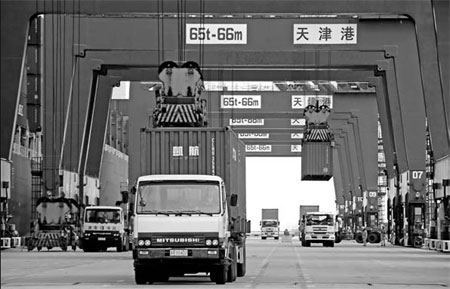|
|

Cargo is loaded at Tianjin Port. Xinhua |
China's ports will be the first to see the benefit of the government's macroeconomic regulation policies, with the effects expected to be clearly visible by as early as April, it was predicted yesterday.
Yu Rumin, chairman of the Tianjin Port Group, said business had already started to pick up in container transport, and there has been an unexpectedly high volume of imported ore.
The port handled nearly 8 million tons in January, he said, even more than the average 5-6 million tons in good years, he said.
"It is mainly because steel plants started to buy ore at a low price to make up for the high price they paid last year, and some smaller plants have run out of storage," explained Yu, who is also a deputy to the National People's Congress (NPC). "The growth should remain throughout the year."
The goal this year for Tianjin Port, the third largest in China for cargo handling, is to transport at least 360 million tons, 4 million tons more than last year, he said.
A record 12.8 billion yuan ($1.9 billion) will be invested to expand the port's navigation channels and build more docks, said Yu, who added: "We are confident we can make a profit. Usually, after the implementation of macroeconomic regulatory policies, no matter how tight or loose, the effects will show up in ports first within half a year."
Sadly, it works both ways, with the effects of the global financial crisis also being first seen at the ports, he said.
The impact, however, was softer for those in northern China, like Tianjin, than those in the south that relied more on exports.
The economic hinterland of Tianjin Port is not as developed in terms of low value-added industries and not as export-dependent as those in the Pearl River Delta, allowing it to achieved a 15-percent growth in cargo throughput and 19-percent growth in container transport last year, he added
To further reduce its reliance on exports, the port is now aiming to explore opportunities by opening new domestic shipping routes to Guangdong province and the Yangtze River Delta over the next 12 months, as well as raise its domestic container traffic from 30 to 50 percent, he said.
The group was also in negotiations to buy smaller ports in North China, he added.
(China Daily 03/10/2009 page6)
|

